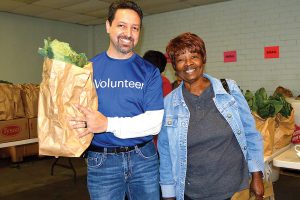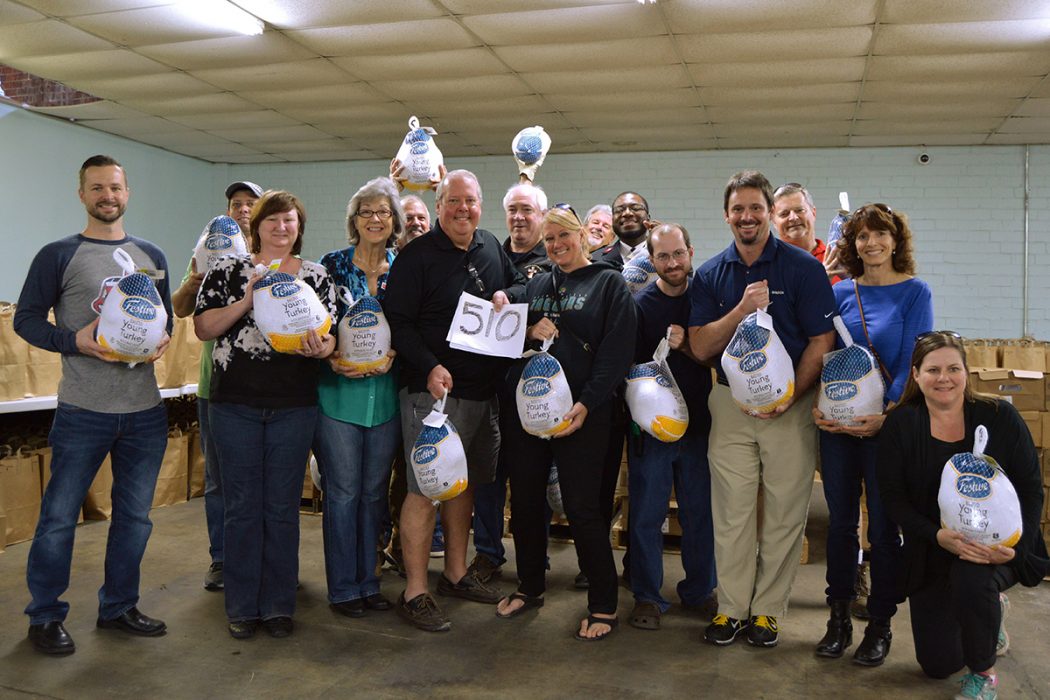As a well-known advocate for the lost, the vulnerable, the needy, the poor, the hurting, the helpless, and the hopeless, it comes as no surprise that The Salvation Army takes food insecurity very seriously.
“From our perspective, we think food insecurity is just as serious of a problem in Jacksonville as homelessness,” said Kelly Belich, community relations coordinator for The Salvation Army. “We can see how it affects the lives of vulnerable populations such as the elderly, the disabled, and veterans.”
The Salvation Army of Northeast Florida seeks to assist the food insecure in two ways – through its food pantry and meal ministry.
“Our food pantry helps mainly low-income individuals and families. We see many elderly or disabled individuals and veterans,” Belich said. “Our nightly meal ministry serves a hot meal to anyone who is hungry every night of the year. We mainly serve the homeless, but it is not uncommon to see families with children, particularly toward the end of the month when money is getting tight.”
Staffed by volunteers from churches, civic groups, local businesses, families and individuals, the Meal Ministry serves a nutritious dinner for unsheltered homeless persons and the working poor seven days a week beginning at 6 p.m. as well as breakfast on Sunday mornings at 8:30 a.m. in the dining room of the Towers Center of Hope facility at 900 W. Adams Street in Downtown Jacksonville. In addition to a hot healthy meal, the dinner hour also provides its clients with valuable social interaction.
Meanwhile, residents staying in Salvation Army shelters receive three meals per day.
In the 10 years from 2007 to 2016, the Army served 482,735 meals to people not staying in their shelter. Last year, 44,010 meals were served, and this year, from January to July 2017, 28,824 meals have been served. “This figure will nearly double by the end of the year due to the holidays and colder weather,” Belich said.

The Salvation Army depends on volunteers to help sort, pack, and distribute food.
The food pantry supplies hungry individuals and families with supplemental groceries out of the warehouse of the Army’s Social Services building located downtown at 140 North Davis Street. In the pantry, clients are offered access to free fresh produce and canned goods. It is open Monday through Friday from 9 a.m. to noon. “Our general rule of thumb is that we serve 50 households per day, five days a week,” Belich said.
In the past decade 36,729 families and 140,826 individuals have been served by the pantry. Last year 7,486 families and 32,818 individuals were served, while in 2017, between January and July, 3,557 families and 17,864 individuals were served. The family counts include only households with children and dependents, while the individual figures include single-person households and the head of the household with dependents, she said.
The Salvation Army is in the process of converting its food pantry to a “client choice” format. Currently, an average family receives a 10-pound bag of protein and a 10-pound bag of selected canned goods, plus any fresh fruits and vegetables that might be available that day. With the new format, clients can choose any items within the pantry, which will offer a diverse selection of food as well as assistance to help clients prepare nutritional foods for the family.
“This model has the added benefit of reducing food waste,” said Belich. “We are very excited about this because it gives the power of decision back to the family, restores dignity, and give people healthier food options,” she said, adding the Army plans to also offer resources to educate families on nutrition and how to prepare healthy foods they may not be familiar with.
The Salvation Army food pantry receives its food from Feeding Northeast Florida, Farm Share, and the United State Department of Agriculture.
Volunteers are needed year-round to help sort and distribute food at the pantry and to serve meals at the Meal Ministry. Monetary and in-kind food donations are always welcome, and the Army particularly appreciates when churches, businesses, and schools hold food drives to help stock the pantry’s shelves. “Making a financial contribution to The Salvation Army is a great way to help. Our mission is to meet human needs without discrimination, and we have long been recognized as excellent stewards of the resources given to us,” said Belich.
“Donated food helps us serve more efficiently. We depend on the Can-U-Care food drive in September through November for our Thanksgiving food distribution to families who have demonstrated financial need for the holidays,” she continued, the Army will furnish and pick up a large barrel to businesses, churches, and schools so they can collect food. The Can-U-Care drive supplies a lot of trimmings for Thanksgiving dinner. “A barrel of canned goods might not seem like a lot, but every donation makes a difference. Last year, in one day alone, we served nearly 1,600 families in Northeast Florida through our Thanksgiving food distribution,” she said.
Assisting in rounding up turkeys for the holidays is Casey Jones of Julington Creek, a survivor of the Miracle-on-the-Hudson plane crash. Jones was so affected by his near-death experience that he started doing the annual turkey drive a few years ago, said Belich. “It’s grown like crazy the past few years and last year he smashed his record with 510 turkeys!”
Funding for the Army’s food programs comes from the United Way, Publix, and the City of Jacksonville as well as from the federal and state government. Supporting the Thanksgiving food distribution with turkeys are Sonny’s BBQ, Walmart, and Sea Breeze Food Service.
The Salvation Army’s food programs also get a boost from Publix’s Food-for-All campaign, during which Publix customers donate at the register to help local organizations fight hunger, Belich said. “You can give any time of year and designate your gift for meals and/or food pantry if you would like your gift used specifically for that purpose,” she said.





